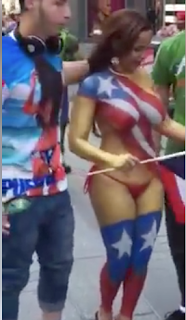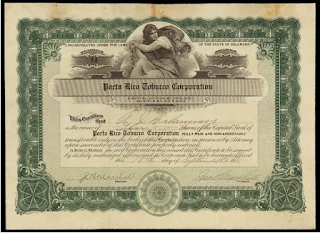Proud Patriotic Puerto-Ricans.......
Christopher Columbus arrived at Puerto Rico in 1493. He originally called the island San Juan Bautista, but thanks to the gold in the river, it was soon known as Puerto Rico, or "rich port;" and the capital city took the name San Juan.

During the Spanish-American War in 1898 U.S. forces launched their invasion of Puerto Rico, the 108-mile-long, 40-mile-wide island that was one of Spain’s two principal possessions in the Caribbean. With little resistance and only seven deaths, U.S. troops under General Nelson A. Miles were able to secure the island by mid-August. After the signing of an armistice with Spain, American troops raised the U.S. flag over the island, formalizing U.S. authority over its one million inhabitants. In December, the Treaty of Paris was signed, ending the Spanish-American War and officially approving the cession of Puerto Rico to the United States.


The very next year, Hurricane San Ciriaco devastated the island. The U.S. sent no relief. The following year, the U.S. declared that the Puerto Rican peso, would no longer be valid currency. Then the U.S. imposed new property taxes on every farmer in Puerto Rico. Look at those three blows right after each other: the hurricane, the currency devaluation, and the new taxes. The result was that the farmers were in extreme distress and they had to get loans to try and stay afloat. By 1940, 80 percent of the arable land in Puerto Rico was U.S.-owned.
When they tried to enact minimum wage legislation for the exploding ranks of these workers, the U.S. Congress simply vetoed it, and
when they tried to push it, the Supreme Court ruled that since Puerto Rico was a U.S. territory and not a state, and that the United States constitution did not apply, even though in 1917, under the terms of the Jones-Shafroth Act, they were called U.S. citizens (sound familiar Washington DC?). So they were found to be U.S. citizens for purposes of military conscription, but they were found not to be U.S. citizens for purposes of having any rights.

 Finally after two decades of its rule, the U.S. government made efforts to Americanize its new possession, including granting full U.S. citizenship to Puerto Ricans in 1917 and considering a measure that would make English the island’s official language. However, during the 1930s, a nationalist movement led by the Popular Democratic Party won wide support across the island, and further U.S. assimilation was successfully opposed. Beginning in 1948, Puerto Ricans could elect their own governor, and in 1952 the U.S. Congress approved a new Puerto Rican constitution that made the island an autonomous U.S. commonwealth, with its citizens retaining American citizenship. The constitution was formally adopted by Puerto Rico on July 25, 1952, the 54th anniversary of the U.S. invasion.
Finally after two decades of its rule, the U.S. government made efforts to Americanize its new possession, including granting full U.S. citizenship to Puerto Ricans in 1917 and considering a measure that would make English the island’s official language. However, during the 1930s, a nationalist movement led by the Popular Democratic Party won wide support across the island, and further U.S. assimilation was successfully opposed. Beginning in 1948, Puerto Ricans could elect their own governor, and in 1952 the U.S. Congress approved a new Puerto Rican constitution that made the island an autonomous U.S. commonwealth, with its citizens retaining American citizenship. The constitution was formally adopted by Puerto Rico on July 25, 1952, the 54th anniversary of the U.S. invasion.


Movements for Puerto Rican statehood, along with lesser movements for Puerto Rican independence, have won supporters on the island, but popular referendums in 1967 and 1993 demonstrated that the majority of Puerto Ricans still supported their special status as a U.S. commonwealth.
 April 21, 2017 will mark the 52nd anniversary of the death of Pedro Albizu Campos. Most Americans likely haven't heard of Albizu Campos or his plan to challenge the United States' control of Puerto Rico. His supporters remember him as an organizer, an intellectual, and a revolutionary. The FBI and the US government labeled him a radical, a terrorist, and a criminal.
April 21, 2017 will mark the 52nd anniversary of the death of Pedro Albizu Campos. Most Americans likely haven't heard of Albizu Campos or his plan to challenge the United States' control of Puerto Rico. His supporters remember him as an organizer, an intellectual, and a revolutionary. The FBI and the US government labeled him a radical, a terrorist, and a criminal.
In 1936, Albizu Campos was imprisoned on sedition charges after helping to successfully organize Puerto Rican workers. Under amazingly dubious circumstances, he was railroaded off the island and imprisoned for 10 years precisely when the island was ready to very aggressively organize for its independence. When he came back in 1947, in very short order, the government put through Public Law 53, the law that made it illegal to utter a word, sing a song, whistle a tune against the United States or in favor of independence. It was basically abrogating the First Amendment rights of 2 million people in order to shut one man up.
After more than a decade in prison, he returned to the island and organized an armed revolt in 1950. His plan was never realized, due in large part to F.B.I. infiltration and harassment as well as legal sanctions such as Public Law 53, the "Gag Law," which made it a criminal act to show any outward support for an independent Puerto Rico. The short-lived violent uprising may mark one of the several times the U.S. military has launched an aerial attack (including Black Wall Street, Tulsa, Oklahoma and on the MOVE movement in Philadelphia) on its own citizens, when National Guard planes strafed the town of Utuado.
 After the Albizu Campos-led, island-wide agricultural strike in January 1934, the U.S government sent down a new governor, General Blanton Winship, who militarized the entire police force. The new Chief of Police, E. Francis Riggs, orchestrated the Rio Piedras Massacre, where four nationalists were assassinated in broad daylight near the campus of the University of Puerto Rico. When asked at a press conference why this happened, Riggs said that if Albizu Campos and his nationalist party continue to agitate the sugar cane workers and the college students, then he was prepared to wage war to the death against all Puerto Ricans.
After the Albizu Campos-led, island-wide agricultural strike in January 1934, the U.S government sent down a new governor, General Blanton Winship, who militarized the entire police force. The new Chief of Police, E. Francis Riggs, orchestrated the Rio Piedras Massacre, where four nationalists were assassinated in broad daylight near the campus of the University of Puerto Rico. When asked at a press conference why this happened, Riggs said that if Albizu Campos and his nationalist party continue to agitate the sugar cane workers and the college students, then he was prepared to wage war to the death against all Puerto Ricans.
Since then there has been a red carpet from Puerto Rico that stretches all the way to Wall Street. It has just been one long succession of corporations going down, extracting resources, and leveraging tax preferences for themselves at the expense of the American taxpayer and the Puerto Rican worker. You have a tremendous tax preference for U.S. investors, hedge fund managers, private equity firms at the same time that they were levying a 16 percent tax on the poor, middle, and working classes of Puerto Rico.
 An island separated by an ocean, a language, a culture, Puerto Ricans are still nonetheless, Americans. They've been American citizens since 1917. They fought the same battles, made the same sacrifices...lost their land in the same way that Native Americans lost their land, and been the subject of discrimination and racism in the same way that African Americans have, sans the lynching. Though they suffered the full spectrum of oppression, being off the map 4,000 miles away they haven't even been able to argue their case effectively So when people say, "Why should Americans care?" they don't realize that Puerto-Ricans are 100 percent Americans and more than paid the price of admission into this community.
An island separated by an ocean, a language, a culture, Puerto Ricans are still nonetheless, Americans. They've been American citizens since 1917. They fought the same battles, made the same sacrifices...lost their land in the same way that Native Americans lost their land, and been the subject of discrimination and racism in the same way that African Americans have, sans the lynching. Though they suffered the full spectrum of oppression, being off the map 4,000 miles away they haven't even been able to argue their case effectively So when people say, "Why should Americans care?" they don't realize that Puerto-Ricans are 100 percent Americans and more than paid the price of admission into this community.
Factors such as the popping of a construction bubble, the dismantlement of the industrial model of development, the expiration of a federal tax break for corporate income, the approval of CAFTA-DR, changes in the global economy, incompetent and servile government administrations, and the island’s colonial relationship with the United States have all contributed to an economic depression current economic contraction in Puerto Rico.
Already bearing the scars of colonialism, and thanks to repressive policies of the I.M.F., the economic malaise has set Puerto Rico back even further. Per capita income in Puerto Rico is almost half that of Mississippi, the U.S.’s poorest state. The jobless rate is 12.6%; in West Virginia, the state with the highest unemployment rate in the U.S., that number is 7.4%. Puerto Rico’s labor participation rate is around 43%, 20 points lower than in the U.S. as a whole. Median household income is almost $7,000 less than in Detroit (and less than half of the U.S. average). And a staggering 45% of the population lives in poverty (compared to about 15% in the U.S.).

 Paul Krugman recently wrote that thanks to the safety net provided by the federal system and “big government,” Puerto Rico’s case “is one of bad times that fall well short of utter disaster.” Like a good philanthropist, our Nobel laureate seems to want Puerto Ricans to be thankful for what they have received, given that they have not ended up like Greece. This myopic take, however well-intentioned, abstracts from the historical processes of political and economic control and wealth extraction by the United States over its colony of 117 years, processes that to this day shape the downward spiral in which a decomposing Puerto Rican society finds itself.
Paul Krugman recently wrote that thanks to the safety net provided by the federal system and “big government,” Puerto Rico’s case “is one of bad times that fall well short of utter disaster.” Like a good philanthropist, our Nobel laureate seems to want Puerto Ricans to be thankful for what they have received, given that they have not ended up like Greece. This myopic take, however well-intentioned, abstracts from the historical processes of political and economic control and wealth extraction by the United States over its colony of 117 years, processes that to this day shape the downward spiral in which a decomposing Puerto Rican society finds itself.
America needs to make a choice. There has to be a decision, either to get married or get divorced. But no more keeping Puerto Rico as its little mistress in the Caribbean. That doesn't work anymore.
黒人浪人
黒人浪人


















Comments
Post a Comment